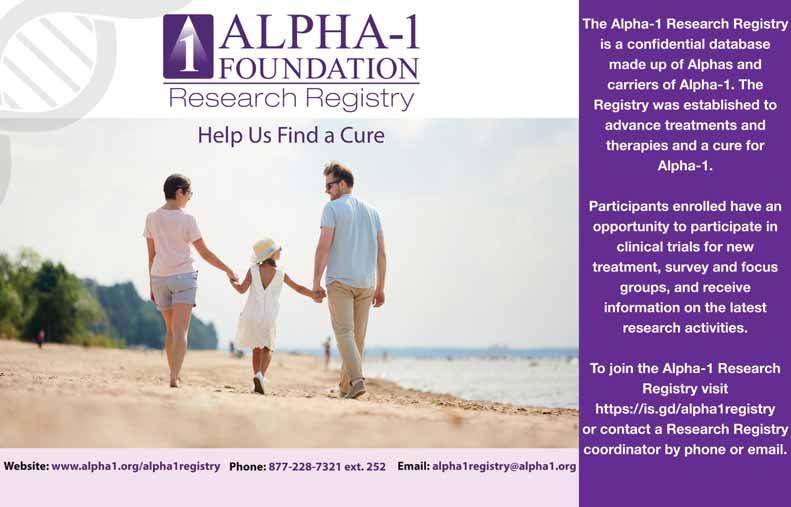ALPHA--TO-ONE
Practical advice, personal experiences and pertinent news for people touched by ALPHA-1































The first quarter of the new year gave us many opportunities to connect with the community and we are excited about the momentum being built toward achieving our goals. We joined Alphas in Orlando, Florida and Chicago, Illinois for Alpha-1 Education Days and in Boston, Massachusetts for the Celtic Connection, an annual Building Friends for a Cure fundraiser. As the Alpha-1 community embraces joining in-person events, we will maintain our focus on gathering safely and continue providing virtual offerings in 2023 and beyond to keep moving our mission forward.
In this issue we are proud to spotlight Dr. Andrew Wilson as the new Scientific Director of the Alpha-1 Foundation. His passion and commitment to the community is evident in his daily work and career. Foundation Board and staff had the privilege of touring the CReM lab and seeing the exciting research in action firsthand (See page 6). The presentations were impressive and truly showcased the incredible work of the dedicated team there. Dr. Wilson’s leadership will advance the impact of the research funded by the Alpha-1 Foundation.
This is an exciting time for the Alpha-1 community as there is hope on the horizon for patients with the launch of new clinical trials coming in the next year. Clinical trials and the role of the Alpha-1 patient will play an integral part in helping bring forward novel therapies for both lung and liver affected patients. You can learn more about clinical trials and how to get involved on page 13.
Our commitment to advance the field through research and science is made possible through regular scientific meetings and conferences. We were excited to host the Alpha-1 Global 5th Research Conference & 8th Patient Congress in Dublin, Ireland from April 13-15. A special thank you to the Alpha-1 Foundation Ireland and the Royal College of Surgeons Ireland together with Prof. Noel “Gerry” McElvaney. More than 25 countries came together to discuss the latest in Alpha-1 research and bring Alphas from all over the world to share experiences and camaraderie.
We look forward to seeing you at the Alpha-1 National Conference in June. It will be the first in-person conference since 2019 and we are thrilled to be able to join safely again after 3 years. This year’s theme “Blazing the Trail Together for Alpha-1” acknowledges the spirit of discovery and trailblazing that the Alpha-1 Foundation has prided itself on for nearly 30 years. At this year’s conference, you can look forward to hearing from leading Alpha-1 experts, meet with others from the Alpha-1 community and learn about all of the programs and resources available at the Alpha-1 Foundation. Learn more about this year’s conference and how to register on page 15.
As we move forward toward more in-person activities and upcoming research opportunities, our priorities remain the same and, as always, the patient is at the center of everything that we do.
Practical advice, personal experiences and pertinent news for people touched by Alpha-1, their families and friends
VOL. 21, NO. 1 (Spring 2023)
Published by the Alpha-1 Foundation
3300 Ponce de Leon Blvd., Coral Gables, FL 33134 (877) 2 CURE A1 (228-7321) www.alpha1.org
Alpha-1 Foundation Board of Directors Executive Committee

Jon Hagstrom*, Chair
Fred Walsh*, Vice Chair
Jeanine D’Armiento, MD, PhD, Immediate Past Chair
Ann Knebel, PhD, RN, Secretary
Kenneth A. Irvine +, Treasurer Members
Mark L. Brantly, MD
Peggy Iverson * Elizabeth Johnson*
Noel G. McElvaney, MD, MCh, BAO, FRCPI, FRCPC Faron Schonfeld*


James K. Stoller, MD, MS (Org Dev)
Catherine Vernon*
Martin R. Zamora, MD Director Emeritus
Alpha-1 Foundation Executive Staff
Scott Santarella, President & Chief Executive Officer
Mark Delvaux, Chief Financial Officer
Andrew A. Wilson, Scientific Director
Robert A. Sandhaus, MD, PhD, FCCP, Clinical Director
Alpha-1-To-One Editorial Board
Patricia Tew*; Gordon Cadwgan, PhD*; Catriona Garry*; William J. Martin II, MD; Robert A. Sandhaus, MD, PhD, FCCP; Bruce C. Trapnell, MD
Managing Editor
Jeanne Kushner
Contributing Editors
Adriana De Arce; Cathey Henderson; Richard Lovrich; Angela McBride; Shakira Molet; Miriam O’Day; Alexis E Artiles Ojeda; Randel Plant; Linda Rodriguez
ALPHA-1-TO-ONE is published by the Alpha-1 Foundation with support from its advertisers. No part may be reproduced in any form by any means without prior written permission of the Alpha-1 Foundation. The contents are not intended to provide medical advice, which should be obtained directly from a physician. The Foundation is not responsible for the accuracy of information expressed in advertisements in this publication.
Advertising: For advertising inquiries, please contact Angela McBride, Senior Director of Corporate Relations at (877) 228-7321 ext. 233, or amcbride@alpha1.org
Letters to the Editor: Please send letters to the editor to Jeanne Kushner, Director of Communications & Public Affairs, at jkushner@ alpha1.org. Letters may be edited for clarity and length.
Sincerely yours,
Scott Santarella President & CEO Alpha-1 FoundationThe Alpha-1 Foundation is committed to finding a cure for Alpha-1 Antitrypsin Deficiency (Alpha-1) and to improving the lives of people affected by Alpha-1 worldwide.
*Diagnosed with Alpha-1 Antitrypsin Deficiency + Diagnosed Family Member
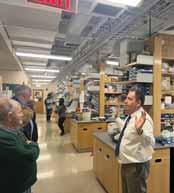
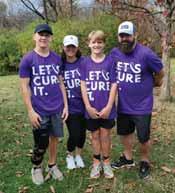


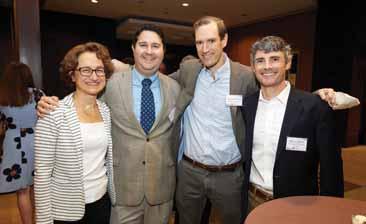
This past November, the Alpha-1 Foundation announced the appointment of Andrew A. Wilson, MD as its new Scientific Director. Dr. Wilson assumed this role with a long-standing passion and commitment to the Alpha-1 community. “On behalf of the Alpha-1 Foundation, I am excited to work with Dr. Wilson to continue the mission-focused work of the Foundation that has been at the forefront of Alpha-1 research for nearly 30 years,” states Scott Santarella, President and CEO of the Alpha-1 Foundation.
As a pulmonary and critical care physician-scientist with a focus on regenerative medicine and stem cell biology, Dr. Wilson’s goal is to advance understanding of and treatment for genetic causes of chronic obstructive pulmonary disease (COPD) and the most common genetic cause of COPD, Alpha-1 Antitrypsin Deficiency (Alpha-1). He has been an active member of the Alpha-1 community since 2006, serving as the head of the Clinical Resource Center (CRC) at Boston University Chobanian & Avedisian School of Medicine, member of the Grant Advisory Committee (GAC) and member of the Research Registry Working Group. Dr Wilson is also the Boston University’s site Principal Investigator for both the Alpha-1 Biomarkers Consortium (A1BC) study and the Alpha-1 Antitrypsin Deficiency Adult Clinical and Genetic Linkage Study.
Dr. Wilson first became involved with the Alpha-1 Foundation through research during his pulmonary and critical care fellowship at Boston University Chobanian & Avedisian School of Medicine. Interested in developing gene therapies for lung disease, he applied for grant funding from the Alpha-1 Foundation in 2006 and was fortunate to be the recipient of a fellowship grant. Over time, his interest in Alpha-1 grew as he became acquainted with the late John W. Walsh, co-founder of the Alpha-1 Foundation, and met Alpha-1 patients at Foundation meetings and events.
“I am honored and humbled to have been selected as the new Scientific Director of the Alpha-1 Foundation. Many researchers who are currently working on Alpha-1 research, myself included, probably wouldn’t be doing so if it were not for the support they have received from the Alpha-1 Foundation over the years. In the same vein, having an organized patient
community is key since translational research relies upon access to patients with the disease. Researchers must be able to find patients. We are fortunate that Alphas are so enthusiastic and generous in their participation in research. I hope that as Scientific Director I will be able to help the Foundation to advance its mission and work towards a cure for AATD.”
In 2012, Dr. Wilson opened the Alpha-1 Center, combining the CRC and the Alpha-1 research program, which has since grown into one of the largest CRCs in the Northeast. The CRC at Boston University is highly engaged with the Alpha-1 community through a variety of mechanisms. The Wilson Lab, located at the Center for Regenerative Medicine (CReM) of Boston University and Boston Medical Center, maintains an active research program focused on Alpha-1. They use patient-derived stem cells, called “induced pluripotent stem cells” or “iPSCs” that can be coaxed to become liver or lung cells in a dish. These cells are used to study how Alpha-1 works in patient cells in the lab and use that system to test potential therapeutics. They also share the cells with other researchers for use in their research efforts directed at developing treatments for Alpha-1 patients.
The four core areas of Dr. Wilson’s research are: I) to confirm the clinical significance of the iPSC platform to model patient biology and demonstrate its potential for testing possible therapeutic agents; II) to better understand the genes and mechanisms that predispose some Alpha-1 patients to develop clinical disease more severely than others; III) to understand how certain genes contribute to development of COPD/emphysema; and IV) to develop gene or cell-based therapies for Alpha-1.
Dr. Wilson and the Wilson Lab have been actively involved in the Alpha-1 community, participating as a team in the annual Escape to the Cape bike trek on Cape Cod for the past eight years and hosting Alpha-1 support groups from Massachusetts to Maine for visits to the CReM. These visits have helped inform the CRC about what is important to the patient community and have allowed patients to hear about ongoing research. In some cases, patients have even been able to see their own cells growing in the lab. The Alpha-1 community honored Dr. Wilson in 2014 with the Shillelagh award at the annual Celtic Connection fundraising event to honor his outstanding commitment to Alpha-1 research.
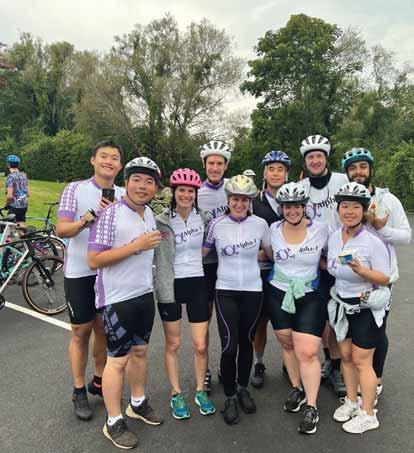
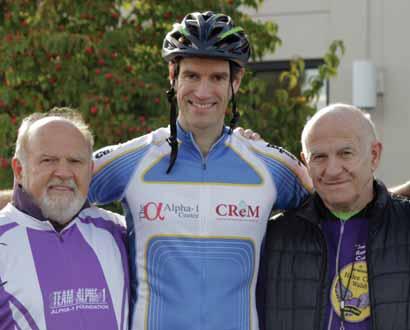
The Alpha-1 Foundation is grateful to Dr. Mark Brantly for serving as the Scientific Director since 2019. “Thank you to Dr. Mark Brantly for his outstanding leadership as Scientific Director for the past three years,” stated Jon Hagstrom, Chair of the Alpha-1 Foundation Board of Directors. “We are honored to have Dr. Brantly join the Alpha-1 Foundation Board of Directors. We are excited to have Dr. Wilson lead us at this exciting time in Alpha-1 research. This would not be possible without the many academic investigators, like Dr. Wilson, whose discoveries have brought the field to this critical juncture.”
“It has been my honor over the last three years to have served as the Alpha-1-Foundation’s Scientific Director and I step down with great confidence that Dr. Andrew Wilson from Boston University will provide cutting-edge scientific direction for the Alpha-1 Foundation in the coming years. The Foundation is very fortunate to have a very successful researcher and clinician as their new scientific director,” said Dr. Mark Brantly.
“With numerous new potential therapeutics 'in the pipeline', this is an exciting time for the Alpha-1 community. I am optimistic that one or more of these treatments will prove beneficial in upcoming clinical trials and look forward to the day that we have more options with the ability to treat and even cure this disease. The Foundation is working on many fronts to realize this vision. Funding of scientific research is one critical part of this approach. One of my primary goals is to bring new, young investigators into the Alpha-1 research community to ensure that we continue to benefit from new ideas and high quality research for years to come.”
On March 10th, Dr. Darrel Kotton and Dr. Andrew Wilson welcomed the Alpha-1 Foundation Board of Directors and staff to tour the Center for Regenerative Medicine (CReM) of Boston University and Boston Medical Center and hear about the exciting Alpha-1 research being conducted in the lab.
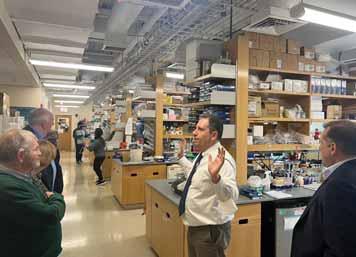
The visit began with a tour led by Dr. Kotton of the 10,000 square foot state-of-the-art facility consisting of wet bench space and 6,000 square feet of offices. Over the years, they have welcomed patient support groups from Maine and Massachusetts to visit the lab, and take pride in being very patient centric.
It was a great opportunity to see the Foundation’s invested research dollars at work and learn more about the Foundation's impact from the beginning. Dr. Wilson kicked off the presentations with a history and overview of the Alpha-1 Center and its impressive research portfolio. Drs. Wilson and Kotton began studying Alpha-1 Antitrypsin Deficiency (Alpha-1) in 2004 as a potential target for gene therapy approaches. Their interest in AATD grew as they studied the disease and met patients at community events. In 2012 they opened the Alpha-1 Center to care for Alpha-1 patients and their families. Since that time, the Alpha-1 Center has grown into one of the largest centers in the nation for AATD-focused care.
The CReM maintains the world’s largest repository of Induced Pluripotent Stem Cells (iPSCs) created from Alpha-1 patients. Because these iPSCs contain genetic information of the patients from whom they were created, they can be used to model genetic diseases using a patient's own cells. In addition to the work done using these cells in the center, they have shared their AATD iPSCs with investigators around the world and with industry partners interested in developing new AATD therapies.
Research Updates & Presentations Included:
AATD liver disease modeling in iPSC models
Dr. Joseph Kaserman, Assistant Professor of Medicine, Pulmonary Section, CReM
Cell-based therapy for AATD liver disease
Anna Smith, PhD Candidate, Gouon-Evan Lab
Gain of function toxicity in AATD lung epithelium
Carly Merritt, PhD Candidate, Wilson Lab
Cell-based therapy for AATD lung disease
Dr. Michael Herriges, Postdoctoral Associate, Kotton Lab
Led by Dr. Wilson, the members of the CReM participate regularly in several Alpha-1 community events, most notably the annual Escape to the Cape Bike Trek that takes place each September on Cape Cod. Each year since 2014, a team of CReM cyclists has joined the Alphas on the Cape for the 165-mile trek and the fellowship encountered along the way. The trek has become a cherished tradition for the team and has allowed them to give something back to the community that has become so important to the CReM, while raising funds to support Alpha-1 research! The CReM also attends the Celtic Connection each year and was excited to be a part of this year’s event held for the first time in-person since the pandemic.
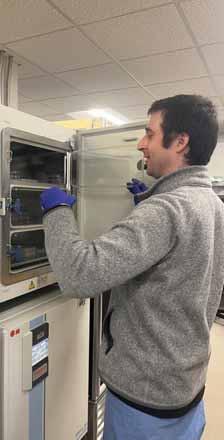
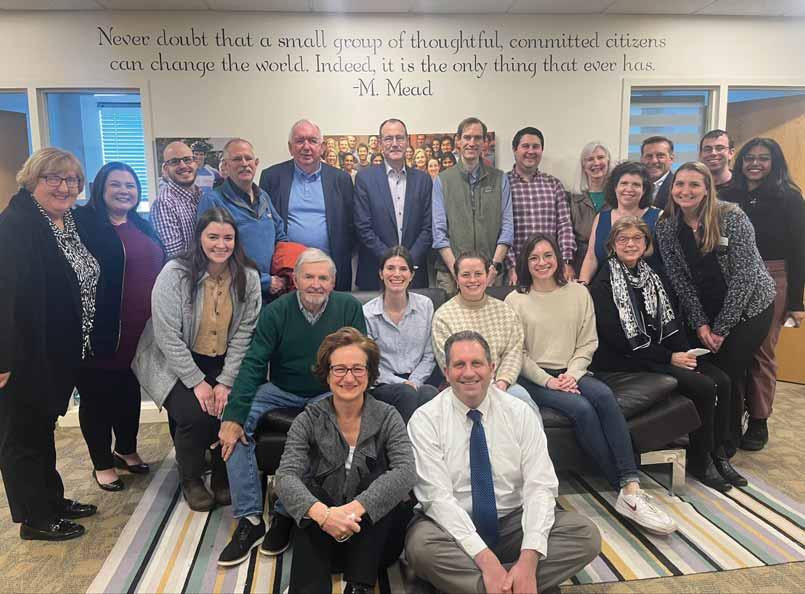
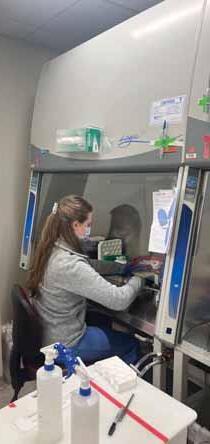
Over 235 people joined together on Saturday, March 11th for the Annual Celtic Connection in Boston, Massachusetts. This Building Friends for a Cure (BFC) community fundraiser honoring Irish heritage raised over $135,000 to support research and related programs to help fund a cure for Alpha-1.
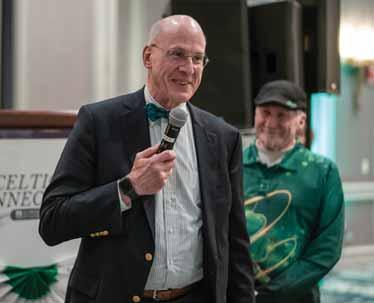
Celtic Connection has become the largest BFC event through the outstanding support of sponsors and the dedication and motivation of the longstanding committee including Julie Berry, Dan Coffin, Kathi Coffin, Bob Healy, Peggy Iverson, Siobhan Lestina, Richard Lovrich, Karen Pittsley, Chase Walsh, Fred Walsh, Kailey Walsh, Ginger Watkins, and Rick White. Thank you for your hard work and commitment leading up to the event and in executing a successful fundraiser. Events, like Celtic Connection, enable members of the Alpha-1 community to get involved and make a difference. Each year the event has grown larger, and it is truly because of the perseverance of the committee.
The highlight of the evening was the 2023 Shillelagh award presented to Dr. James K. Stoller for his longstanding commitment to the Alpha-1 community. The Shillelagh is a traditional Celtic weapon associated with Ireland, and the award symbolizes the battle that Alpha-1 doctors, researchers, and leadership wage against Alpha-1. Dr. Stoller is a prolific author of more than 335 publications, of which nearly 100 of them are related to Alpha-1 Antitrypsin Deficiency (Alpha-1). He is a principal organizer of the NHLBI Alpha-1 antitrypsin registry study and the Data Coordinating Center for the 7-year study.
Dr. Stoller helped start the Alpha-1 Foundation Patient Registry, has been the Chair of the Alpha-1 Foundation Medical and Scientific Advisory Committee and a long-time member of the Alpha-1 Foundation Board of Directors. He is the Chair of the Education Institute at the Cleveland Clinic and has recently worked with the Foundation to launch a new Alpha-1 Continuing Medical Education
(CME) series for healthcare professionals. He has been involved in the Foundation since its inception and the Foundation has benefited immensely from Dr. Stoller’s organizational skills and wisdom.
Dr. Stoller was humbled and deeply honored to be recognized among the past recipients of this highly prestigious award for their shared dedication and commitment to Alphas worldwide. Dr. Stoller recognized the three terms that came to mind while accepting the award on Saturday evening: Commitment, Optimism and Talent. The deep commitment of this community is both personal and professional and there has never been a better time for the prospect for dramatic improvements for therapeutic options for Alphas and it is because of the talented community of clinicians, scientists, patients, industry and investigators that are all working together towards a cure.
Dr. Stoller posed for a picture with past recipients in attendance proudly holding up the Shillelagh including Dr. Terrence R. Flotte (2010), Dr. Edwin K. “Ed” Silverman (2013), Dr. Jeanine M. D’Armiento (2018), Prof. Noel G. “Gerry” McElvaney (2012), Dr. Andrew Wilson (2014), Dr. Darrell N. Kotton (2010) and Fred Walsh (2015). Additional past recipients include COVID-19 Frontline Workers (2021),
Dr. Virginia Clark (2020), Dr. Charlie Strange (2019), AlphaNet (2017), Dr. Chris Mueller and Dr. Scott E. Kopec (2016), Dr. Bartolome R. Celli (2015), John W. Walsh (2015), Dr. Gerry M. Turino (2014) Dr. Robert A. Sandhaus (2013) and Dr. Gordon L. Snider (2011)
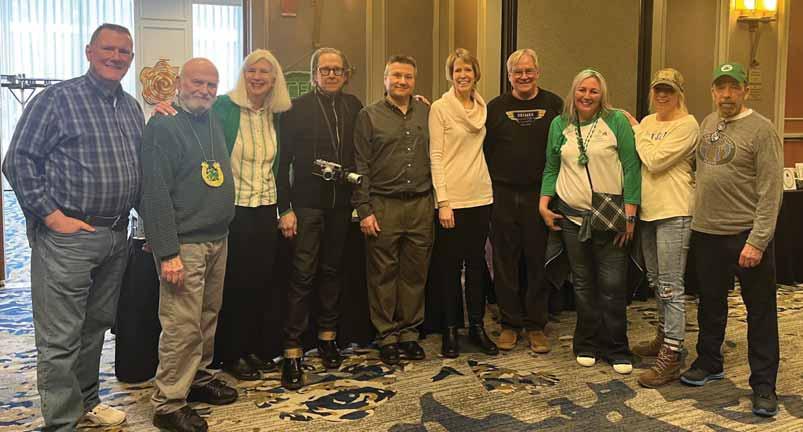
The evening kicked off with a silent auction filled with items including a custom-built Alpha-1/Celtic themed acoustic guitar made by Alpha Dan Coffin and friends, autographed sports memorabilia, vacation stays, and beautiful Irish pieces. Everything in the auction sold thanks to the bidders online and at the event.
Guests were entertained by the talented youth dancers from the local Irish dance studio, Harney’s Academy of Irish Dance located in Walpole, Massachusetts. The performers wowed the guests with their fancy footwork, flawless choreography, and beautiful costumes. Dancers ranged in age from five years old to high school seniors. It has been a privilege to see them master their techniques in Irish Dance over the years. Live Irish music was enjoyed by all from “Hogan’s Goat” providing a festive

atmosphere and guests enjoyed a traditional Irish dinner. The corned beef and cabbage made it a quintessential St. Patrick’s Day celebration.
Thank you to the generous sponsors that made the evening possible: AlphaNet, CSL Behring, Grifols, Takeda, Ascella Health, Beam Therapeutics, Brigham and Women’s Hospital Lung Center, Ruth & Gordon E. Cadwgan, CReM of Boston University and Boston Medical Center, Ergonomics Group Inc (EGI), Eversana, Joan & Oliver Garry, Michael Winik, Petrie’s Flower Shoppe, Presidio, The Reidy Family, Patty Tew, Target Tack LLC, University of Massachusetts, Vertex and WEI.
Q: How do I travel on airplanes if I require oxygen?
A: Oxygen cylinders are considered a "Dangerous Good" and forbidden on aircrafts. If you require oxygen, you will need to have a portable oxygen concentrator (POC), with 1.5 times the battery life of your total travel time including the flight. Airlines vary on their requirements, be sure to check their website in advance. The airlines require 48-hour notice that you will be traveling with a POC. You will need to be seated at a window seat, no bulkhead rows and no exit rows. Always remember to use the wheelchair services to the gate, the airport terminals are very big, and you do not want to be out of breath and use more oxygen than necessary.
Q: Can I wear a facemask over my cannula?
A: Absolutely, this will help protect you on flights from COVID, influenza and other respiratory illnesses.
Q: Does altitude affect oxygen levels?
A: Our bodies do best at sea level, when we are in high altitude (between 4,900 and 11, 500 feet above sea level) less pressure is available to allow oxygen molecules to diffuse from the lungs into the blood. As we breathe, the lungs expand, causing the pressure in the lungs to decrease relative to the atmospheric pressure. At sea level, the atmospheric pressure is greater than the pressure in the lungs, and oxygen molecules can diffuse more easily into the bloodstream. Our bodies must compensate as we go to higher altitudes, including increased respiratory rate to get more oxygen, increased heart rate to help pump that oxygen to the body and we redistribute the oxygenated blood to vital organs, decreasing the flow to digestive system and commonly causing headaches and nausea.
Q: What should I have when I travel to be prepared?
A: Save important information on your smartphone, including all your hotel numbers, taxi numbers, home oxygen provider and healthcare provider information.
Travel with all your prescriptions and take photos of them, too. Know the airline, cruise lines and hotel policies regarding oxygen and mobility needs. Travel with a jump starter battery kit as a battery backup for your POC.
Q: How do I know which POC is best for me?
A: First consider your oxygen flow rate, when patients require above a flow rate of 3LPM you will need to take time to see if any of the options will accommodate your respiratory needs. Then further define your oxygen usage - 24/7, nighttime only, on exertion only, altitude only. Some patients may only need a small unit like the Inogen, some may only need a small stationary unit to sleep with, others may use a hybrid unit that while larger in size, will both provide an "on demand" for portability and a "continuous flow" for sleeping. Still others may opt for two machines, a small one for portability and a small stationary for sleeping.
Whether nighttime only or oxygen travel in general, you should always start with the company who is currently providing your home oxygen equipment. They may have a "travel" program in place and can take care of your needs. I caution you to not start off a conversation using terms like "I need a POC" or "I need a portable to travel," better just to say "I need to travel and how can you assist me." Larger national companies may have a branch in the town where you will travel and can arrange a stationary unit for your short visit.
To learn more, visit www.alpha1.org to watch the presentation from the February 2023 Orlando Alpha-1 Education Day.


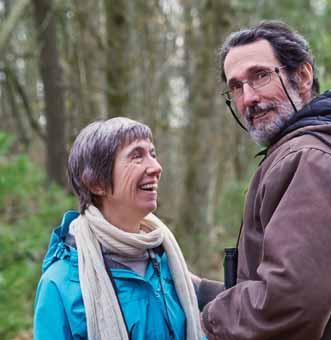
These highlights do not include all the information needed to use PROLASTIN-C LIQUID safely and effectively. See full prescribing information for PROLASTIN-C LIQUID.
PROLASTIN-C LIQUID (Alpha1-Proteinase Inhibitor [Human]) Solution for Intravenous Injection
Initial U.S. Approval: 1987
---------------------INDICATIONS AND USAGE --------------------
PROLASTIN®-C LIQUID is an Alpha1-Proteinase Inhibitor (Human) (Alpha1-PI) indicated for chronic augmentation and maintenance therapy in adults with clinical evidence of emphysema due to severe hereditary deficiency of Alpha1-PI (alpha1-antitrypsin deficiency).
Limitations of Use:
• The effect of augmentation therapy with any Alpha1-PI, including PROLASTIN-C LIQUID, on pulmonary exacerbations and on the progression of emphysema in Alpha1-PI deficiency has not been conclusively demonstrated in randomized, controlled clinical trials.
• Clinical data demonstrating the long-term effects of chronic augmentation or maintenance therapy with PROLASTIN-C LIQUID are not available.
• PROLASTIN-C LIQUID is not indicated as therapy for lung disease in patients in whom severe Alpha1-PI deficiency has not been established.
For intravenous use only.
• Dose: 60 mg/kg body weight intravenously once per week.
• Dose ranging studies using efficacy endpoints have not been performed with any Alpha1-PI product, including PROLASTIN-C LIQUID.
• Administration: 0.08 mL/kg/min as determined by patient response and comfort.
For injection: approximately 500 mg (10 mL), 1,000 mg (20 mL) and 4,000 mg (80 mL) of a solution for injection in single-dose vials.
------------------------CONTRAINDICATIONS -----------------------
• Immunoglobulin A (IgA) deficient patients with antibodies against IgA.
• History of anaphylaxis or other severe systemic reaction to Alpha1-PI.
----------------
• Severe hypersensitivity and anaphylactic reactions may occur in IgA deficient patients with antibodies against IgA. Discontinue administration of the product and initiate appropriate emergency treatment if hypersensitivity reactions occur.
• Because PROLASTIN-C LIQUID is made from human plasma, it may carry a risk of transmitting infectious agents, e.g., viruses, the variant Creutzfeldt-Jakob disease (vCJD) agent, and, theoretically, the Creutzfeldt-Jakob disease (CJD) agent.
The most common adverse reactions during PROLASTIN-C LIQUID clinical trials in > 5% of subjects were diarrhea and fatigue, each of which occurred in 2 subjects (6%).
To report SUSPECTED ADVERSE REACTIONS, contact Grifols Therapeutics LLC at 1-800-520-2807 or FDA at 1-800-FDA-1088 or www.fda.gov/medwatch.
Grifols Therapeutics LLC
Research Triangle Park, NC 27709 USA
U.S. License No. 1871
3062338/3062339
Revised: 5/2020

Clinical trials are an important part of clinical research and at the heart of all medical advances. Without them, we would not have any of the approved treatments or medicines that help enhance, extend, and in some cases, save lives.
At their core, clinical trials look at new ways to prevent, detect, or treat disease. Those treatments might be new drugs or new combinations of drugs, new surgical procedures or devices, or new ways to use existing treatments. Clinical trials can also look at other aspects of care, such as improving the quality of life for people with chronic illnesses, like Alpha-1 Antitrypsin Deficiency (Alpha-1). Ultimately, the goal of clinical trials is to determine if a new test or treatment works and is safe.
Patients participate in clinical trials for a variety of reasons. Healthy volunteers say they participate to help others and to contribute to moving science forward. Participants with an illness or disease participate to help others, but also to possibly receive the newest treatment and to have the additional care and attention from the clinical trial staff.
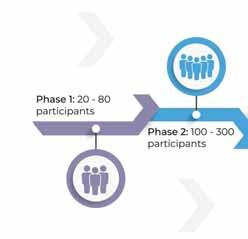
In the rare disease community, it is often clinical trials that offer the most hope to find better treatments for others in the future. In the Alpha-1 world, there is hope on the horizon. Over the next few months and years, there will be an influx of clinical trials for both liver and lung affected patients to learn about and consider enrolling in. Here’s what you need to know to help you navigate the clinical trial world and determine if you want to enroll and participate, and what to expect once you do.
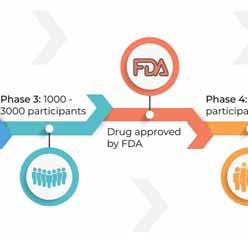
A clinical trial is a research study in which one or more human subjects are prospectively assigned to one or more interventions to evaluate the effects on health-related biomedical or behavioral outcomes. When you volunteer to take part in clinical research, you help physicians and researchers learn more about Alpha-1 and improve healthcare for Alphas in the future.
A clinical trial will always start with an informed consent so that you can ask the study team any questions you may have regarding participating in the clinical trial.
The informed consent is a document that is presented to you explaining the potential risks and benefits associated with the clinical trial. Once you agree to take part in the clinical trial, the informed consent will be signed by both you and a member of the study team (physician, nurse practitioner, research nurse, or clinical research coordinator). A copy of the informed consent will be provided for your records. If you ever want to, you can withdraw your consent at any point.
Eligibility criteria are the main reasons why a person can or cannot participate in a clinical study. These requirements are created by the clinical trial sponsor (often in consult with medical experts and regulatory agencies) for safety purposes to protect participants from harm. Some examples of inclusion criteria include age and established diagnosis of Alpha-1.
Some exclusion criteria examples are clinically significant health concerns other than Alpha-1, and lung or liver transplant. You can search for current clinical trials by visiting the Alpha-1 Clinical Trials Search Engine: www.alpha1.org/alphasfriends-family/resources/ct/
What role does the Alpha-1 Research Registry play in the clinical trial recruitment process?
The Alpha-1 Research Registry is a confidential database comprised of individuals diagnosed with Alpha-1 and individuals identified as Alpha-1 carriers. The Registry facilitates research initiatives and promotes the development of improved treatments and a cure for Alpha-1. Individuals
enrolled in the Registry have the ongoing opportunity to participate directly in clinical trials of new therapeutic approaches in addition to other research opportunities. To determine if you are currently enrolled in the Alpha-1 Research Registry, simply use our new look up tool: www. alpha1.org/rrlt/
Being a part of the Alpha-1 Research Registry allows you to be notified first of new clinical trials that you might qualify to participate in. Being a part of the Registry helps move research forward quicker by identifying and notifying Alphas that can participate in a study as soon as they become available.
in their laboratory and
animals for toxicity.
is therapy will undergo (4) four phases where they effectiveness.
PHASE1 dose of the new treatment and identifying any side effects.
PHASE2 of clinical trials are conducted once the sponsor or principal investigator determines the treatment is 100-300 participants and safety continues to be evaluated along with monitoring short-term side effects.
PHASE3 more phases. This phase will compare the safety and effectiveness against the current standard treatment and will be administered to a larger group.
PHASE4 clinical trials are often called the “real-world study”. These trials are performed after the drug is released and after a wider acceptance withing the medical community is prescribing these therapies. Phase 4 aims
Over the next several months, the Alpha-1 Foundation will be providing updates on clinical trials that are being launched, opportunities to take part in those trials and all pertinent information you will need to learn about and participate in trials and be part of helping advance the field toward a cure for Alpha-1.







To register online, visit: a1f.org/alpha1conference
Registration Deadline: May 15, 2023
REGISTRATION HOURS
Thursday, June 8
1:00 pm to 4:00 pm CT
Friday, June 9
9:00 am to 5:00 pm CT
Saturday, June 10
8:00 am to 2:00 pm CT
EXHIBIT HALL HOURS
Friday, June 9
12:30 pm to 5:30 pm CT
Saturday, June 10
8:00 am to 5:00 pm CT
8:00 am – 10:00 amBreakfast
10:00 am – 12:15 pm
AIRPORT & PARKING
Hyatt Regency
DFW International Airport
2334 N International Pkwy, Dallas, Texas, 75261
Self-parking is complimentary.
AGENDA & FAQs
The conference at a glance is subject to change. For a detailed Agenda and Things
You Need To Know, visit a1f.org/alpha1conference.
OXYGEN TRAVEL FUND
This program provides oxygen and equipment for Alphas in Alpha-1 educational events. To apply, call (877) 228-7321 ext. 251 with at least 30 days notice.
Book your hotel room online: a1f.info/dallas2023
Discounted Rate: $129/night plus tax
Rate Deadline: May 15, 2023
free educational program for nurses on Saturday from 2-4 pm. Three (3) CEU credits will be in this program.
KIDS & TEENS
The Alpha-1 Kids program sponsors an Alpha-1 Kids room on Saturday with activities for children and teens.
Introduction to Alpha-1 Track: Conference Orientation for First Time Attendees, Alpha-1 101 Lung, and Alpha-1 101 Liver
10:00 am – 12:15 pm Therapeutic Innovation Track: The Foundation’s Research Agenda, Lung & Liver Imaging, and the Alpha-1 Biomarkers Consortium (A1BC) 12:30 pm – 2:00 pmLunch 2:00 pm – 4:10 pm
Introduction to Alpha-1 Track: Clinical Trials & How a Therapy Comes to Market 2:00 pm – 4:10 pm
Therapeutic Innovation Track: Emerging Therapies in Alpha-1 4:30 pm – 5:30 pmAlpha-1 Research Registry Celebration 6:30 pm – 9:00 pm
Reception: Western Party
, J u n e 1 0 t h 8:00 am – 9:00 amBreakfast 9:00 am – 12:00 pmGeneral Sessions including an Alpha-1 Research Panel
pm – 1:00 pmMeet the Speakers
pm – 2:00 pmLunch
pm – 4:50 pm Three Afternoon Tracks: General Patient Care & Treatment as an Alpha - Questions to Ask Your Doctor, Regenerative Medicine: The State of the Science & Tissue Regeneration, Pre- & Post-Transplant, Current & Future Therapies in Liver Disease, Genetics, Family Testing, & Phenotypes, Long Term Health & Wellness for Alpha-1 Kids, & more! 7:00 pm - 9:00 pmDinner Reception
For more information and to register for the conference, visit a1f.org/alpha1conference.
What is GLASSIA?
GLASSIA is a medicine containing human Alpha₁-Proteinase
Inhibitor (Alpha₁-PI) that is used to treat adults with lung disease (emphysema) because of severe Alpha₁-antitrypsin (Alpha₁) deficiency. GLASSIA is not meant to be used as a therapy for lung disease other than severe Alpha₁ deficiency. Effects of GLASSIA on worsening lung function and emphysema progression have not been proven in clinical trials. Long-term effects of Alpha₁ replacement and maintenance therapy have not been studied.
What is the most important information I need to know about GLASSIA?

• GLASSIA can cause severe allergic reactions including hives, swelling in the mouth or throat, itching, tightness in the chest, trouble breathing, wheezing, faintness or low blood pressure
• If you will be taking GLASSIA outside a healthcare setting, ask your healthcare provider (HCP) about an epinephrine pen and/or other supportive care for certain severe allergic reactions.

Who should not use GLASSIA?
Do not use GLASSIA if you:
• Have immunoglobulin A (IgA) deficiency with antibodies to IgA

• Have a severe allergic reaction to human Alpha₁-PI products.
What are the possible or reasonably likely side effects of GLASSIA?
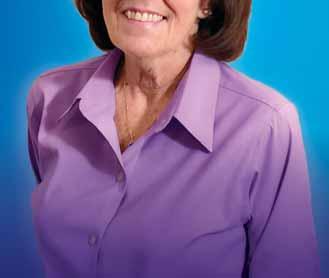
If any of the following problems occur contact your healthcare provider (HCP) or call emergency services right away:

• Worsening or flare-up of your chronic obstructive pulmonary disease (COPD)

• Hives, swelling in the mouth or throat, itching, chest tightness, trouble breathing, wheezing, fainting or dizziness. These could be signs of a serious allergic reaction.


The most common side effects that may occur are headache and upper respiratory tract infections.
Other possible side effects of GLASSIA include:



• Cough
• Sinus infection
• Chest discomfort
• Dizziness
• Increased liver enzymes
• Shortness of breath
• Nausea
• Fatigue
These are not all the possible side effects. Tell your HCP about any side effect that bothers you or that does not go away. You are encouraged to report negative side effects of prescription drugs to the FDA. Visit www.fda.gov/medwatch, or call 1-800-FDA-1088.
Please see the Important Facts About GLASSIA on the next page.
“My pulmonologist recommended GLASSIA as the best option for me.”
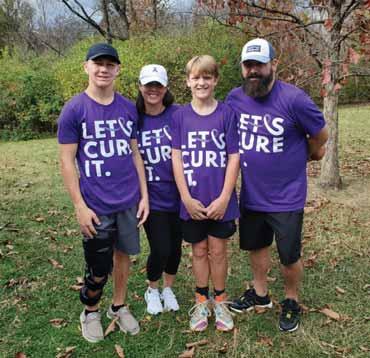
“The best resource the Alpha-1 Foundation offers is connection. We live in Lexington, Kentucky and we have yet to meet another Alpha where we live. We have been traveling to Cincinnati Children’s for Harrison’s care for the past eleven years and we have formed a strong connection to others there, but I love that we can also connect on a regular basis with other Alphas and families from afar through the Foundation.”
Hillary and J.R. Stephens noticed at 4 weeks old that their newborn baby, Harrison, was lethargic, was severely jaundiced and was failing to grow. Hillary had a gut feeling that something was not right and called the pediatrician. After bloodwork was taken, she received a call back that evening. Their pediatrician wanted them to see a gastrointestinal doctor the next day at the University of Kentucky Children’s Hospital. After a couple of weeks of tests and a liver biopsy, Harrison was diagnosed with Alpha-1 Antitrypsin Deficiency (Alpha-1).
With no known family history, Hillary and J.R. decided to get tested and found that they were both carriers, as well as their older son Jackson. Getting Harrison’s diagnosis as an infant was overwhelming, especially since it is a rare disease. Their pediatrician referred them to the Alpha-1 Foundation and Hillary began listening in on the Alpha-1 Kids virtual support group calls each month. This was their first interaction with the Foundation and other Alpha-1 Kids parents. The calls provided comfort and ease and answered many questions that other parents also had. The Foundation’s website became a great resource for materials, and information from past presentations.
The Stephens family got involved in raising awareness and funds through Alpha-1 Awareness Month and the Alpha-1 Virtual Walk. Team Harrison has participated in the annual Alpha-1 Virtual Walk for over 6 years and gathered their friends and family at a local park for football games and raffles to raise funds for Alpha-1 research and related programs. Together, their 2023 team of over 45 individuals made them this year’s largest team. Fundraising has become a tradition each year that has transformed into a passion of theirs.
As Alpha-1 parents, their advice to other parents of Alpha-1 kids is to start educating your child from the youngest age possible about their diagnosis. Have constant conversations with them, be open and honest and embrace this diagnosis. Most importantly, find a strong circle of support—whether is it family, friends, doctors, the Alpha-1 Foundation… or in the Stephen’s case, all of the above.
“The best advice we received was from our pediatrician that told us that this was going to be a rollercoaster and to not let ourselves get too high or too low. We remembered this with each doctor’s appointment. We are very realistic; however, you have to have hope!”
Hillary and J.R. wish for their now 13-year-old son to never let his Alpha-1 diagnosis hold him back or worry him. He is tough, blessed, protected and amazing! They also wish that he always remains grateful for these things and remembers to help others. The Stephens’ ultimate wish is for a cure for all Alphas and their families!





The Alpha-1 Foundation is excited to announce that we are partnering with the Cleveland Clinic to create a new healthcare professional, medical education series! Here are some highlights of the program. Take the course here: http://ccfcme.org/Alpha-1
This educational series is designed to aid in the knowledge, diagnostic and treatment competence needs of healthcare providers to diagnose, treat, and provide better care for Alpha-1 patients.
The professional education program targets various types of healthcare professionals, including, pulmonologists, hepatologists, pediatric lung, and liver physicians, liver and lung transplant physicians, nurse practitioners, physician assistants, genetics counselors, respiratory therapists, and internal medicine/general medicine physicians.
Each video, as part of this series, includes a patient testimonial about their Alpha-1 experience.
This online program has been approved for AMA PRA Category 1 Credits™

The Foundation has partnered with Dr. Jamie Stoller and the Cleveland Clinic,

which is accrediting the program, to develop this new healthcare professional, medical education program.

A big THANK YOU to patients, Dr. Stoller and his Cleveland Clinic team, members of the Foundation’s Medical and Scientific Advisory Committee (MASAC), several board of directors of members, and Cleveland Clinic clinical staff who volunteered to record videos to help us create a robust Alpha-1 Foundation Continuing Medical Education Series.

immediately suspected Alpha-1 Antitrypsin Deficiency and tested him. A short time later, Mike was diagnosed with Alpha-1, in addition to moderate to severe emphysema.
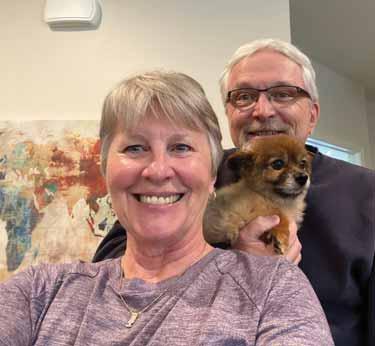
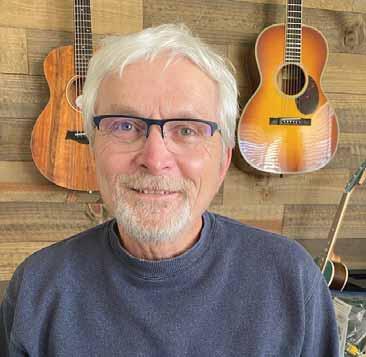
Even though Mike finally had a diagnosis, he, like most, had never heard of Alpha-1. However, thanks to his AlphaNet Coordinator and all the resources available through AlphaNet and the Alpha-1 Foundation, Mike became more knowledgeable regarding the Alpha-1 diagnosis and more confident that the condition is manageable and not the death sentence he had originally feared.
Mike Dempsey is an AlphaNet Coordinator serving the state of Texas from Fishers, Indiana. Mike’s Alpha-1 journey is an all-too common one.
Mike Dempsey is an AlphaNet Coordinator serving the state of Texas from Fishers, Indiana. Mike’s Alpha-1 journey is an all-too common one. Several years ago, he began having occasional episodes of shortness of breath. His doctor at the time ordered a multitude of tests to determine the cause. Unfortunately, the doctor was unable to make a definitive diagnosis and prescribed an inhaler. Mike’s shortness of breath episodes continued to worsen. After visiting with a couple of other physicians and getting a gamut of diagnostic tested and dismissed symptoms, he became more frustrated that things were not getting better.
Both of Mike’s parents died as a result of severe respiratory issues and struggled to breathe daily near the end of their lives. Finally, he insisted to be referred to a pulmonologist. Fortunately, the pulmonologist
“Being an AlphaNet Coordinator is truly a blessing. I have the opportunity now to give back – to help fellow Alpha’s navigate their way through this condition. I have the pleasure and responsibility to help them better understand their Alpha-1 diagnosis and assure them that their lives can still be enjoyable and productive.”
t was 2014 when I received the news that would change the trajectory of my life forever. During a routine exam at the doctor, my father discovered unusual scar tissue in his liver. The scarring on his liver was a surprise for us all since my father was not a frequent alcohol drinker. He always kept himself generally healthy with a well-maintained BMI, so the doctor decided to do further testing to determine what could be wrong and discovered that my father had Alpha-1 Antitrypsin Deficiency (Alpha-1).
the Lung Docs, a pulmonary and Critical care group of consultants in Chattanooga. In 2018, Dr. Czarnecki, the local Chattanooga Clinical Resource Center (CRC), encouraged me to reach out to become the local support group leader. This opportunity allows me to work with our local health care providers, partners, and independent pulmonary specialists to encourage testing and provide information about Alpha-1. Being a part of multiple meetings at hospitals, plasma centers, and even within my own construction company office, I have been able to educate a wide range of groups, from newly diagnosed Alphas to area physicians and healthcare professionals.
Thankfully, my work in advocacy did not stop there. After working within my own community, I began to expand my desire for awareness of Alpha-1 by advocating within legislative and research settings in Nashville, TN and Washington, DC. It is important to note that I believe being a voice at the state and federal level is critical for legislatures to acknowledge Alphas and aid with research funding to find a cure for Alpha-1. I am grateful to say that I have been able to provide education to others within the state legislation and within other organizations where I have leadership roles.
After being diagnosed with Alpha-1, my father decided to have our entire family tested. We discovered that my mother was also a carrier of Alpha-1 which made me the “lucky” ZZ phenotype. Like anyone dealing with a rare medical disease or condition, my family and I took the news hard. We were scared, but with the help of the Alpha-1 Foundation we found a network of physicians, Alphas and friends that made us realize that being diagnosed with Alpha-1 is not the end. At the Alpha-1 Foundation we found a great supportive family and with their help, we were able to make better decisions that led us to healthier lifestyles. Connecting with the Foundation also allowed me to become an advocate for awareness within my community in Chattanooga, Tennessee.
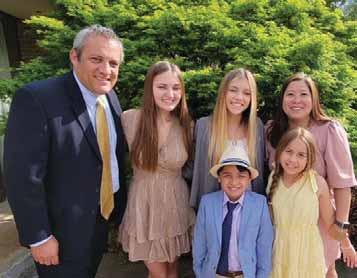
About a year after my family’s diagnosis and in search of more information about Alpha-1, I joined my first support group meeting held at
It is amazing to me how one life altering moment catapulted me to a passionate and rewarding life path where I am making a difference in the lives of others. The best part about being an Alpha-1 support group leader is helping those newly diagnosed in understanding that being diagnosed is not an end but a beginning. It is rewarding to help all Alphas understand that there is a great and supportive structure for Alphas out there who are available to teach you about the uniqueness of being an Alpha-1 patient or caregiver and good habits to take care of yourself as you navigate this new diagnosis in your life. In the end, I want everyone reading this to know YOU ARE NOT ALONE .
the
EFFICACY proven in clinical trials to raise and maintain levels of the Alpha-1 protein


Discover
PURITY achieved through rigorous and exacting manufacturing procedures*


CONVENIENCE of low-volume infusion in as little as 15 minutes†
*While all efforts are made to prevent transmission of infectious agents and viruses, the risk of transmission cannot be completely eliminated. †Average infusion time is based on an infusion rate of 0.08 mL/kg/min for a 165lb patient. Individual experiences may vary.
Strengthened supply. Renewed confidence. Announcing a reliable supply of ZEMAIRA thanks to the approval of an additional manufacturing site.
Talk to your doctor about ZEMAIRA and learn more at ZEMAIRA.com.
IMPORTANT SAFETY INFORMATION
Alpha1-Proteinase Inhibitor (Human), ZEMAIRA® is indicated to raise the plasma level of alpha1-proteinase inhibitor (A1-PI) in patients with A1-PI deficiency and related emphysema. The effect of this raised level on the frequency of pulmonary exacerbations and the progression of emphysema have not been established in clinical trials.
Please see additional Important Safety Information and brief summary of prescribing information for ZEMAIRA on the following page.
ZEMAIRA is manufactured and distributed by CSL Behring LLC. ZEMAIRA® and Biotherapies for Life® are registered trademarks of CSL Behring LLC. © 2022 CSL Behring LLC




1020 First Avenue, PO Box 61501, King of Prussia, PA 19406-0901 USA www.CSLBehring.com www.ZEMAIRA.com ZMR-0063-APR22

ZEMAIRA may not be suitable for everyone; for example, people with known hypersensitivity to components used to make ZEMAIRA, those with a history of anaphylaxis or severe systemic response to A1-PI products, and those with certain IgA deficiencies. If you think any of these may apply to you, ask your doctor
Early signs of hypersensitivity reactions to ZEMAIRA include hives, rash, tightness of the chest, unusual breathing difficulty, wheezing, and feeling faint. Immediately discontinue use and consult with physician if such symptoms occur
In clinical studies, the following adverse reactions were reported in at least 5% of subjects receiving ZEMAIRA: headache, sinusitis, upper respiratory infection, bronchitis, fatigue, increased cough, fever, injection-site bleeding, nasal symptoms, sore throat, and swelled blood vessels.
Because ZEMAIRA is made from human blood, the risk of transmitting infectious agents, including viruses and, theoretically, the CreutzfeldtJakob disease (CJD) agent and its variant (vCJD), cannot be completely eliminated
Please see full prescribing information for ZEMAIRA.
You are encouraged to report negative side effects of prescription drugs to the FDA. Visit www.fda.gov/medwatch, or call 1-800-FDA-1088.
You can also report side effects to CSL Behring’s Pharmacovigilance Department at 1-866-915-6958.
ZEMAIRA®, Alpha1-Proteinase Inhibitor (Human)
lyophilized powder for reconstitution for intravenous use
Initial U.S. Approval: 2003
BRIEF SUMMARY OF PRESCRIBING INFORMATION
These highlights do not include all the information needed to use ZEMAIRA safely and effectively. See full prescribing information for ZEMAIRA
-----------------------------------INDICATIONS AND USAGE----------------------------------
• ZEMAIRA is an alpha1-proteinase inhibitor (A1-PI) indicated for chronic augmentation and maintenance therapy in adults with A1-PI deficiency and clinical evidence of emphysema.
• The effect of augmentation therapy with ZEMAIRA or any A1-PI product on pulmonary exacerbations and on the progression of emphysema in A1-PI deficiency has not been demonstrated in randomized, controlled clinical studies
• ZEMAIRA is not indicated as therapy for lung disease patients in whom severe A1-PI deficiency has not been established.
--------------------------------DOSAGE FORMS AND STRENGTHS
ZEMAIRA is supplied in a single-use vial containing approximately 1000 mg, 4000 mg, or 5000 mg of functionally active A1-PI as a white to off-white lyophilized powder for reconstitution with 20 mL, 76 mL, or 95 mL of Sterile Water for Injection, USP. The amount of functional A1-PI is printed on the vial label and carton.
CONTRAINDICATIONS -----------------------------------
• History of anaphylaxis or severe systemic reactions to ZEMAIRA or A1-PI protein.
• Immunoglobulin A (IgA)-deficient patients with antibodies against IgA, due to the risk of severe hypersensitivity
• Observe any signs of hypersensitivity such as tachycardia, hypotension, confusion, syncope, oxygen consumption decrease, and pharyngeal edema when administering ZEMAIRA to patients with known hypersensitivity to an A1-PI product.
• Patients with selective or severe IgA deficiency can develop antibodies to IgA and, therefore, have a greater risk of developing potentially severe hypersensitivity and anaphylactic reactions. If anaphylactic or severe anaphylactoid reactions occur, discontinue the infusion immediately
• Because ZEMAIRA is made from human blood, it may carry a risk of transmitting infectious agents, e.g., viruses, the variant Creutzfeldt-Jakob disease (vCJD) agent and, theoretically, the Creutzfeldt-Jakob disease (CJD) agent.
• Serious adverse reactions reported following administration of ZEMAIRA in prelicensure clinical trials included one event each in separate subjects of bronchitis and dyspnea, and one event each in a single subject of chest pain, cerebral ischemia and convulsion.
• The most common adverse reactions occurring in at least 5% of subjects receiving ZEMAIRA in all pre-licensure clinical trials were headache, sinusitis, upper respiratory infection, bronchitis, asthenia, cough increased, fever, injection site hemorrhage, rhinitis, sore throat, and vasodilation
To report SUSPECTED ADVERSE REACTIONS, contact CSL Behring Pharmacovigilance at 1-866-915-6958 or FDA at 1-800-FDA-1088 or www.fda.gov/medwatch
Based on April 2019 revision
You are encouraged to report negative side effects of prescription drugs to the FDA. Visit www.fda.gov/medwatch, or call 1-800-FDA-1088.
You can also report side effects to CSL Behring’s Pharmacovigilance Department at 1-866-915-6958.
A planned gift can benefit you, your loved ones and the fight for a cure for Alpha-1 Antitrypsin Deficiency (Alpha-1) . Wills and bequests are two important parts of any legacy plan. They help make sure your assets are distributed in a way that best aligns with your values. Aside from giving you peace of mind, your will and other estate planning documents provide an ideal opportunity to tell future generations how much you care about their future.
Anyone, regardless of age or income, can gain from financial and estate planning. Planned giving can enable charitable donations at a level that you might not have thought possible, while maximizing the tax benefits for you and your family. The Alpha-1 Legacy Society is open to all those that leave the Alpha-1 Foundation a planned gift, no matter the amount.

Whether you’ve already decided to make a legacy gift or are exploring your options, our team is happy to help! Please contact us with any questions.
Yes! Members of the Alpha-1 Legacy Society are entitled to the following benefits:
- Special member reception at annual Alpha-1 National Conference
- Annual meeting with Alpha-1 Foundation leadership
- Invitations to attend research update meetings
- Society lapel pin to wear to events
- Alpha-1 Legacy Society newsletter
- Recognition in the Alpha-1-To-One magazine
- Special recognition at meetings and conferences
The John W. Walsh Founders Circle amcbride@alpha1.org
This circle is named after John W. Walsh, co-founder of the Alpha-1 Foundation who dedicated his life’s work to finding a cure for Alpha-1, and is intended to pay tribute to his legacy. Members of this circle would have notified the Foundation of their intention to have the Alpha-1 Foundation as a primary beneficiary of a planned gift of $50,000 or more. Additional benefits include recognition on a plaque at the Foundation offices and a reception at the Foundation’s biennial Investigators meeting to hear researchers report on their studies.


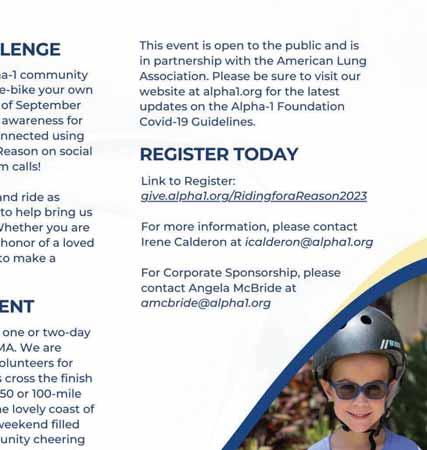
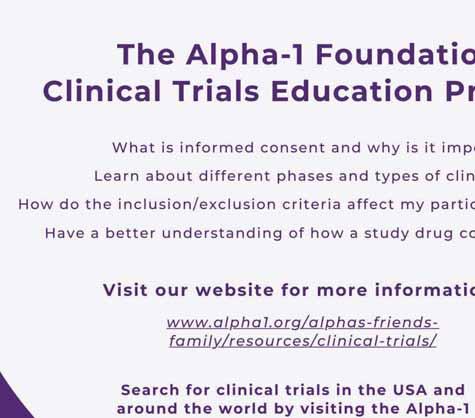


The health and well- being of the Alpha-1 community are our top priorities. The COVID event grid ensures all our in-person events are held in a safe manner. View the COVID grid for up-to-date COVID protocols on the Alpha-1 Foundation website: www.alpha1.org
Do you receive the monthly e-newsletter “Community Currents”? This is a good time to check to make sure that you are on our email list. Update your contact information by visiting a1f.org/a1fsubscribe
Support groups are meeting both in-person and virtually on Zoom to provide everyone the support and education they need.
To find your local Alpha-1 Support Group and view the complete list of upcoming meetings, visit the Events Calendar at www.alpha1.org
June 9-11, 2023
August 5, 2023
Alpha-1 National ConferenceDallas, TX
Alpha-1 Education Day
November 11, 2023Alpha-1 Education Day
December 2, 2023
Alpha-1 Education Day
Denver, CO
Boston, MA
Raleigh, NC
For more information about the Alpha-1 Education Days, please visit alpha1.org/education
August 6, 2023
Step Forward for Alpha-1 Walk & PicnicDenver, CO
September 2023 Riding for a ReasonNationwide
September 22-23, 2023 Escape to the Cape
Cape Cod, MA
November Alpha-1 Virtual Walk Nationwide
For more information about Building Friends for a Cure, please contact: Angela McBride, (877) 228-7321 ext. 233 or amcbride@alpha1.org
